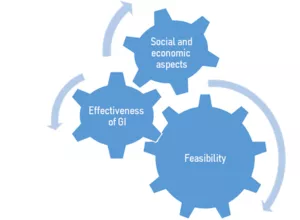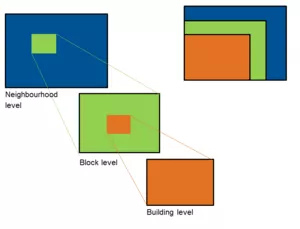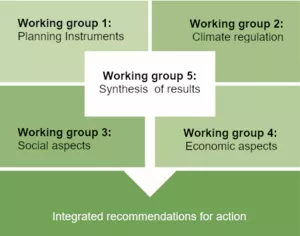
Working group 1: Planning Instruments
Decision-makers require a solid basis for argumentation to ensure that green infrastructure and climate resilience are adequately taken into account in the planning processes. The aim of working group 1 is to analyse the existing implementation options, the legal framework as well as recent developments in the public building law, regarding the consideration of green infrastructure measures in development projects and/or redevelopments.

Working group 2: Climate regulation – Evaluation of Measures
Working group 2 balances the climate regulation performance of green infrastructure and its energy efficiency in selected project areas. The analysis ranges from individual buildings to the entire urban quarter. As analysis methods, modelling and simulations are used which examine various aspects.

Working group 3: Social aspects of climate change-resilient neighbourhood development
Working group 3 deals with various social aspects and questions that have to be considered in a climate-sensitive neighbourhood development within the context of green infrastructures. The overarching aims of the individual studies in this working group include recording impacts as well as investigating and presenting design options.

Working group 4: Economic aspects of green infrastructure
City Greenspaces provide diverse ecosystem services to urban society. The aim of working group 4 is to illustrate the economic aspects of climate impacting ecosystem services.

Working group 5: Synthesis of results
In working group 5, the results from working groups 1 to 4 are aggregated and exchange between project partners is encouraged. The aim is to develop integrated recommendations for action for successful development and implementation of climate change resilient neighbourhoods. The recommended courses of action are intended to demonstrate the importance of green infrastructure for municipal decision-making processes and to promote their integration into urban development.
